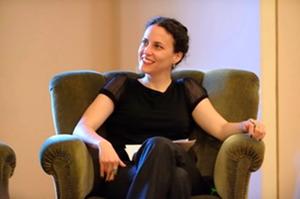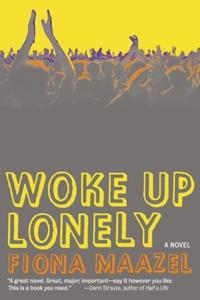
|
|
| photo: Andreas Lamm | |
Fiona Maazel, author of Last Last Chance, is the winner of the Bard Prize for Fiction and a National Book Foundation "5 Under 35" honoree. She teaches at Brooklyn College, New York University, Princeton and Columbia, and was appointed the Picador Guest Professor at the University of Leipzig, Germany, in 2012. She lives in Brooklyn, N.Y. Her new novel, Woke Up Lonely, is from Graywolf Press (April 2, 2013).
On your nightstand now:
The Dead Fish Museum by Charles D'Ambrosio, A Hologram for the King by Dave Eggers, My Name Is Red by Orhan Pamuk and Exercises in Style by Raymond Queneau.
Favorite book when you were a child:
The Sunbeam Library's Holly and Robby Visit Valentine Valley. This was actually the first book I ever read. It's about these kids who go looking for the perfect valentine, but who can't find it until they realize the perfect valentine is actually the person reading the book. So there you go: a lesson in empathy for a five-year-old (though I didn't actually start reading until I was seven or something grossly delayed like that). Point is: this little book was trying to make explicit--even to dramatize--what the reading experience is supposed to be like when it works: a chance to see yourself ennobled or flayed, indicted or at least appraised.
Your top five authors:
Dante, Homer, Dostoevsky, Faulkner, Thomas Hardy.
Book you've faked reading:
Ulysses by James Joyce. I just can't do it. And I don't even feel that badly about it. I love Dubliners and A Portrait of the Artist as a Young Man--"The ticking went on unceasingly; and it seemed to this saint that the sound of the ticking was the ceaseless repetition of the words--ever, never; ever, never. Ever to be hell, never to be in Heaven; ever to be shut off from the presence of God, never to enjoy the beatific vision...."--but Ulysses? I once went to an exhibit of first-edition Ulysses. Half the books hadn't even been cracked (which you could tell because the pages were still uncut). So, Ezra Pound? I'm saying he read half of Ulysses, tops.

The Ogre by Michael Tournier. Not everyone's cup of tea. And for good reason. The novel's about a mechanic turned pederast turned Nazi who's also the Christ bearer, in one way or another. Unbelievably beautiful, rich prose. Dark--so dark--but clear-eyed when it comes to observing the world; e.g., "There's probably nothing more moving in a man's life than the accidental discovery of his own perversion." Or, more spectacularly, the following paragraph, which I've though about so much over the years, it's pathological:
"April 20, 1938. Happiness? That entails comfort, organization, a constructed stability altogether foreign to me. To have troubles is to feel the scaffolding that is happiness shaken by the blows of fate. In this sense I am safe. Trouble cannot reach me because I have no scaffolding. I am a man of sadness and joy, a completely different alternative to that of happiness-unhappiness. I live naked and solitary, without family or friends, keeping alive by a trade so beneath me that I need think about it no more than I think about my breathing or my digestion. My usual moral climate is jet-black sadness, opaque and somber. But this darkness is often shot through by flashing joys, unexpected and unmerited, which swiftly die out but leave my eyes full of gold and dancing fireflies."
Dancing fireflies! What joy, in its aftermath, feels like for a man locked in comprehensive and unremitting despair.
Book you've bought for the cover:
I have never done that!
Book that changed your life:
Tess of the d'Urbervilles by Thomas Hardy. I probably read this novel in high school. It's overwrought and melodramatic, but never mind that. It's painful. It's hugely intelligent about people. Characters in a Hardy novel are complicated and confused. And the governing voice in Tess is mindful of the universe's disregard for us to the point of tragedy. I probably wanted to become a writer after reading this novel, though it would take me years to admit it. I certainly want all of my novels to read like Thomas Hardy, though I'm pretty sure this isn't going to happen.
Favorite line from a book:
Cruel! I have so many favorite lines, I can't choose just one. But, okay, I will, with caveat that it's just one favorite among many. So:
"Bill Houston sat still, enjoying and enduring the tick of his heart through a day of rain." --from Angels by Denis Johnson.
Enjoying and enduring? If that doesn't distill our experience of life on earth, I don't know what does.
Book you most want to read again for the first time:
Madame Bovary by Flaubert. It was a revelation then--I was in college--and you know what I could use right about now? A good revelation.

